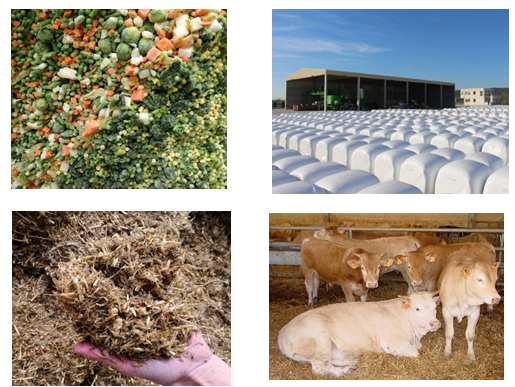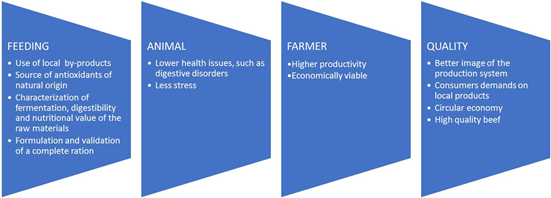The meat sector has been recently affected by a considerable drop in consumption, being one of the main reasons, the growing concern of people on the impact of animal production in the environment and animal welfare. This was perceived in Spain within the Protected Geographical Indication meat label: the PGI Ternera de Navarra, (http://www.terneradenavarra.com/igp/). Thus, stakeholders involved in this meat specification are interested in developing innovations tackling this issue. Another problem that farmers face is the high cost of production, and the feed offered to the animal represents a high percentage of that cost in the animal production activity.
In order to exploit the feeding options produced locally, it was proposed to include the vegetable by-products generated in the agri-food industry of the Ebro Valley region (that includes Navarra, La Rioja and Aragón), in the rations of fattening calves as a raw material. Besides, these are materials that are generated in large quantities, around 120,000 - 150,000 tons/year, by the Ebro Valley agri-food industry, meaning a real management problem due to the volume it represents and the few recovery options available.
The following pictures show the by-products from the food industry, the micro-silages obtained with these raw materials and Pirenaica young bulls under the PGI Ternera de Navarra.

The innovation, at the same time, pretends to demonstrate a potential benefit in the animal and in the meat quality due to the content of polyphenols in the by-products when used in fattening feedlots.
In this context, the project is firmly linked to the consumer concern about the impact of animal production. Therefore, there is a real need to achieve a sustainability improvement in the processes. These objectives go together with the need to optimize available resources, reduce the water footprint and the carbon footprint of the processes, as well as methane emissions into the atmosphere.
In short, the BEEF + project hopes to provide greater added value to the process and the product, in search of healthy properties in the meat, which represents a responsible, profitable and sustainable cycle, improving the level of customer satisfaction and the image of the sector, thus helping to promote the consumption of beef.
The project, foresees different benefits, “from feed to food”:

The main bottleneck in this innovation was the absence of standard nutritional values of most of the by-products in order to calculate a balanced ration. Thus, one of the tasks that we are addressing is the characterization of ruminal fermentation and in vitro digestibility of these raw materials, as well as their nutritional value.
This innovation could thus provide:
- Technical information on the nutritive values of new raw materials for animal feeding.
- Circularity of the agri-food industry by-products.
- Economic benefits for livestock by reducing their external dependence on feeding materials.
The original idea for this project relies on the company TRASA. The company has the aim of introducing innovative products to the market and, at the same time, giving value to the agri-food industry by-products. In this context, ruminant nutrition is an efficient circularity tool. TRASA provides micro-silages to different livestock and Beef+ is the first scientific approach to demonstrating the benefits of this feeding system. The project Beef+ started in April 2020 and is carried out in collaboration between TRASA and the Universidad Pública de Navarra, UPNA IS-FOOD Institute, and is funded by the Gobierno de Navarra, Proyectos I+D 2020. The research groups LACTIKER-Universidad del Pais Vasco and Neiker-Tecnalia also collaborate in this project.
Besides, the obtained knowledge could be applied in other countries and also in different beef and small ruminant systems.
This innovation was presented by Kizkitza Insausti (Universidad Pública de Navarra) in the General Assembly meeting from BovINE project (22nd of June 2021). The recorded presentation can be seeing below:
Authors: Kizkitza Insausti Barrenetxea, Irantzu Goenaga Uceda, Virginia C. Resconi, Jakeline Vieira Romero.
Additional information:
- https://trasa.es/
- https://www.youtube.com/watch?v=J0qQ4tqzPKI
- Hannah H.E.Van ZantenaMartin K.Van IttersumbImke J.M.De Boera 2019. The role of farm animals in a circular food system. Global Food Security, Volume 21, Pages 18-22.
Contact person: Kizkitza Insausti (kizkitza.insausti@unavarra.es)